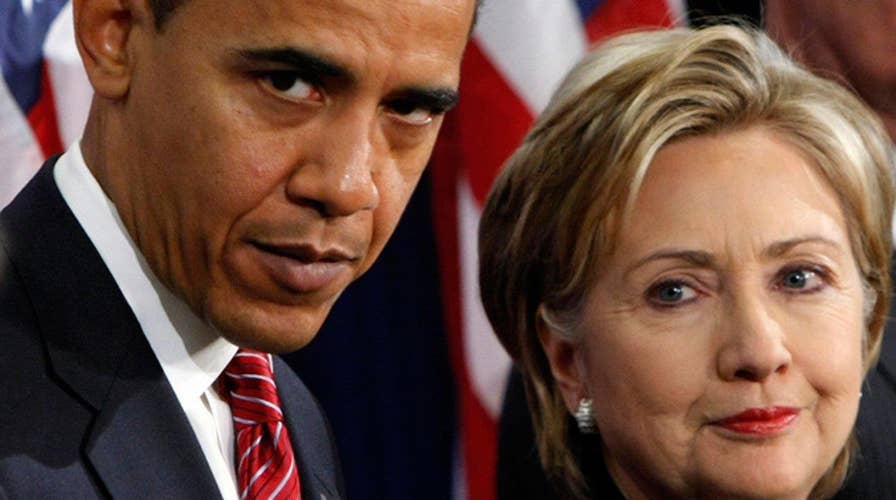Clinton and Obama call Orlando shooting 'terror' and 'hate'
Is the language used in the investigation and response significant?
President Obama and Hillary Clinton campaign together next week for the first time this year, and their decision to meet up in Charlotte says a lot about how her campaign views her path to replace him in the White House.
Democrats see North Carolina as a prime place to expand into Republican territory against Donald Trump, building upon one of Obama's biggest triumphs in 2008 and his narrow loss four years ago.
The state's electorate has become more diverse since Obama's first presidential campaign. Women play an increasingly influential role in the state's politics, giving Clinton an opportunity to play up her potential to become the first woman to win the White House.
And contentious moves by the GOP-controlled state legislature to exclude sexual orientation and gender identity from statewide anti-discrimination protections and to require transgender people to use restrooms corresponding to the sex on their birth certificate in public buildings has touched a nerve in the battleground state.
"I told her that the state is winnable. I think she believes that in her core," said Transportation Secretary Anthony Foxx, a former Charlotte mayor, describing a recent conversation with Clinton. "North Carolina is a classic battleground state. It's a state with people who are hungry for progressive change."
Foxx added: "There's been a lot of things at the state level that have reminded people that North Carolina's proud progressive tradition is under assault right now."
The Obama-Clinton event comes three days after Clinton gave a voluntary 3 ½ hour interview at FBI headquarters about her use of a private, homebrew email server. While the interview was expected and some legal experts view prosecution as exceedingly unlikely, the ongoing investigation represents a major risk for Democrats and poses as an unwelcome distraction.
Clinton's campaign is targeting about a dozen battleground states that were fiercely contested by Obama and Republican nominee Mitt Romney in 2012. Like Obama, she enters the summer with a number of pathways to reach 270 electoral votes, with large states such as Florida, Ohio and North Carolina potentially to put her over the top on Election Day.
Clinton, the presumptive Democratic nominee, had planned to appear with Obama in Green Bay, Wisconsin, in mid-June, but the rally was postponed after the deadly Orlando nightclub shooting. Campaign officials said Democrats feel they have largely consolidated support for Clinton in Wisconsin in the weeks since, prompting them to shift their splashy kickoff in the city that held Obama's 2012 Democratic convention.
Taylor Griffin, a Republican former aide to President George W. Bush who unsuccessfully sought a seat in Congress this year, said Trump has been effective in building support among tea party activists, who have played an important role in GOP elections since 2010, and conservatives longing for an outsider.
"His support is stronger and his base is more unified," Griffin said, comparing Trump to Clinton's Democratic base. "You hear a lot more about wailing and gnashing of teeth about Trump in D.C. than in North Carolina."
Voter registration statistics underscore a competitive state: North Carolina has about 2.6 million registered Democrats, compared with 2 million registered Republicans and 1.9 million unaffiliated registered voters. Women make up about 53 percent of registered voters.
Much of Clinton's focus will center on registering new voters in the Triangle — the cities of Raleigh, Durham and Chapel Hill — and mobilizing black voters throughout the state. In 2012, Obama trailed Romney in North Carolina for much of the election but was able to keep the contest competitive because of the support of black voters, who turned out in large numbers.
Democrats reported registering about 340,000 voters in 2012 and black voters accounted for about 23 percent of the electorate that year, slightly more than in 2008.
At least for now, Clinton has the airwaves largely to herself. Her campaign plans to spend more than $4 million on ads in North Carolina before the Democratic National Convention in late July — her third largest investment behind battleground heavyweights Florida and Ohio.
Priorities USA, a super PAC backing Clinton, is similarly focused on the state. The group plans to spend at least $12 million in North Carolina by the November election, according to Kantar Media's CMAG advertising tracker.
Trump's campaign has not begun advertising in the general election anywhere in the country. And none of the groups supporting him has put up commercials in North Carolina.
"She could do what (Obama) did eight years ago," said Gary Pearce, a Democratic strategist and adviser to former Gov. Jim Hunt, a Clinton supporter. "It's hard to see a way that a Republican gets to the White House without winning North Carolina."





